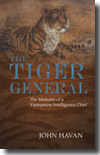| Our Publications | ||
| Books by Title | ||
| Books by Author | ||
| Books by Country | ||
| E-books | ||
| About | ||
| Orchid Press E-books | ||
| Distributed E-books | ||
| Our Bookshop | ||
| About Us | ||
| Browse Shop | ||
| How to Buy | ||
| Contact Us | ||
| WE BUY BOOKS AND LIBRARIES | ||
|
||
Interview With the Author

The Tiger General
The Memoirs of a Vietnamese Intelligence Chief
by John Havan
2011, 440 pp., 22 x 14 cm., softcover.
ISBN-13: 978-974-524-135-0 $19.95
AUTHOR JOHN HAVAN ON ‘HISTORICAL FACTION’
Interviewed by Ezra Kyrill Erker
(Bangkok Post: Arts & Culture January 29,2012)
Why do you write in English rather than Thai—how do the languages compare?
When my first wife passed away in January, 1994, in Singapore, both my daughters insisted I come and live with them. One lived in Hong Kong and one in the Philippines. My wife and I had lived in HK for years, so I opted for Manila. I lived on my own, rebuilt my life, remarried in 1998, bought a lot and built a house where we now live. I am still here because the cost of living can be covered by my income (I teach English literature at an International Baccalaureate school) and pension. If my income were twice the present size, I would move to Chiang Mai. I like Thailand. I am a closet Buddhist. If it were three times bigger, I would move to southern France, where the people are friendly, the sun shines every day, wine is good and food excellent.
Is the book a novel, memoir or work of historical non-fiction?
Historical faction. Hai is a composite character. His early days are based on what I learned from talking to Viet Minh and Viet Cong prisoners and/or converts to the VM or VC, most of whom led hard lives before they joined up. The main part is based on the most famous communist Vietnamese spy, Pham Xuan An. We were friends for many years because he raised German shepherds and so did I. We never talked politics until 1980, when I returned to Vietnam as a tourist and visited him. We talked a lot thereafter and my horizons widened. Some of Hai is what I personally know about what happened in the disaster called the ‘Vietnam War’—the total confusion on the American side, both in Washington and in Saigon; the apathy and venality in Saigon at government level; the grim, termite-like focus in Hanoi. My dad was finance minister in the Diem government, I was trilingual at a time when Vietnam was moving away from France and sidling up to America. I hobnobbed with the Diplomatic Corps in Saigon, made friends in high places and saw what was really going on behind the scenes. My work also put me into contact with key US and Vietnamese military figures. I travelled a lot, mostly by helicopter, and had a first-hand view of why, with time, it was inevitable we had to lose what was a just war.
Hai is the name of my second cousin, who started out as an infantry lieutenant and ended up as a police colonel in the CIO. He is a paraplegic now. He was caught in 1975 and spent some 14 years in rehabilitation camps in north and south VN, released under the Orderly Departure Programme in 1990. He was in bad shape. We picked him up in Hanoi, took him to Thailand and eventually sent him to the States, where his family had escaped to in 1976.[The prequel] Mandarin is essentially about my grandfather, who spent decades in Japan and Siam and China looking for political support for the nationalist fight against French colonialism; he failed and returned to look after his family. Another man who also exiled himself in order to look for help against France was HC Minh, who ended up in Russia for some 30 years. You know the rest.
Your father was born in Vietnam, your mother in the UK, you in France, and you worked for the US as a defence contractor and now live in the Philippines. Where do you consider home—or the place that most shaped the way you think?
Vietnam taught me an excellent lesson—pragmatism. Focus on what can be done; forget what ought to be done. Live for now; tomorrow will take of itself. Home is where I happen to be living. There is good and bad everywhere; in fact, if your stomach can take it, living in Third World countries has many advantages.
The detail in the book is extraordinary—a story of a nation in the 20th century as well as a personal narrative…
I have always been a reader and a note-taker, and I have a photographic memory. And a very strong imagination. Together, once I was out of the war (1955-1972) and out of my second career, I sat down and began putting it all together around 1998.
The results were Mandarin, then Tiger, and now (tentatively) Kaleidoscope of War, some 40 short stories told in the first person by VM, VC, GVN and US personnel who played a role in the VN War. I also have a spy story coming up.
In the 21st-century political landscape, what is one danger the world has to remain vigilant against?
The rise of a superpower. Now that colonialism, fascism and communism are dead but not quite buried, we [the UN] should ensure that neither the US, or Russia, or China can develop an overwhelming military capability through controlling the manufacture of everyday weapons. Best approach—globalising trade to put money in everyone’s pocket, and developing maximum student exchanges to broaden young minds.
[Read a review from The Bangkok Post] [More Orchid Press Reviews]
PO Box 70, Trinity TB, NL, A0C 2S0, Canada
Telephone: +1 709-330-4703